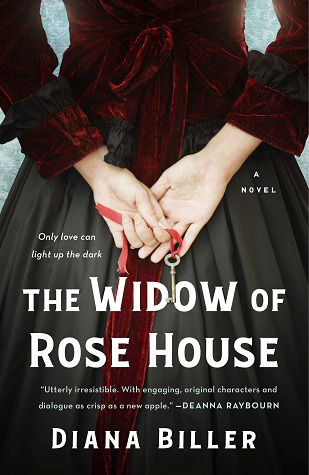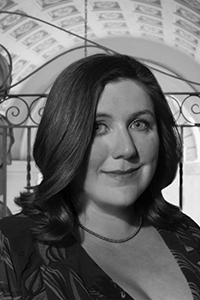ARC Review: ‘The Widow of Rose House’ by Diana Biller + Excerpt
FTC Disclosure: I received a complimentary copy of the book from the publisher in exchange for an honest review. This does not affect my opinion of the book or the content of my review.
Affiliate Disclosure: This post contains Amazon affiliate links you can use to purchase the book. If you buy the book using that link, A Book Lovin' Mama's Blog earns a small commission at no extra cost to you from any purchases made through these links. You can read the full disclosure underneath the Privacy Policy.

The Widow of Rose House
by Diana BillerPublished by St. Martin's Griffin on October 8, 2019
SubGenres: Historical Fiction
Format: eArc
Pages: 352
Add to Goodreads
Purchase at Amazon | Apple | Google Play | Kobo

A young widow restores a dilapidated mansion with the assistance of a charming, eccentric genius, only to find the house is full of dangerous secrets in this effervescent Gilded Age debut novel
It's 1875, and Alva Webster has perfected her stiff upper lip after three years of being pilloried in the presses of two continents over fleeing her abusive husband. Now his sudden death allows her to return to New York to make a fresh start, restoring Liefdehuis, a dilapidated Hyde Park mansion, and hopefully her reputation at the same time. However, fresh starts aren't as easy as they seem, as Alva discovers when stories of a haunting at Liefdehuis begin to reach her. But Alva doesn't believe in ghosts. So when the eccentric and brilliant professor, Samuel Moore, appears and informs her that he can get to the bottom of the mystery that surrounds Liefdehuis, she turns him down flat. She doesn't need any more complications in her life―especially not a handsome, convention-flouting, scandal-raising one like Sam.
Unfortunately, though Alva is loath to admit it, Sam, a pioneer in electric lighting and a member of the nationally-adored Moore family of scientists, is the only one who can help. Together, the two delve into the tragic secrets wreathing Alva's new home while Sam attempts to unlock Alva's history―and her heart.
Set during the Gilded Age in New York City, The Widow of Rose House is a gorgeous debut by Diana Biller, with a darkly Victorian Gothic flair and an intrepid and resilient American heroine guaranteed to delight readers.
The Widow of Rose House is the debut book of author Diana Biller, and it’s the perfect book to read during the Autumn season. It’s not a spooky book but does involve ghosts and mystery. I was excited to read Diana Biller’s debut novel because of the synopsis, but also the beautiful cover. This is one book I plan on buying in paperback so that it can be included in my library.
The main female protagonist Alva Webster has purchased the Liefdehuis house, which is supposedly haunted to renovate it hopefully. She wants the designs from the renovation of the house for her book that she is planning on having published. She doesn’t believe in ghosts, though. The male protagonist Samuel Moore does believe in ghosts and will do anything to discover the spirits of the Liefdehuis house. Unfortunately, Alva doesn’t want anything to do with Samuel and his quest. She is haunted by her past thanks to her late husband. She’s a widow, and rumors had spread about her due to what her husband told everyone when she separated from him and tried to divorce him. Instead, though, he is killed in Paris, and now she is back in New York to hopefully live a better life after being married to such a monster. Her family doesn’t want anything to do with her, and everyone chooses to believe the rumors of Alva thanks to her late husband. Although Sam is fascinated with her and doesn’t believe the rumors, he will do anything to win her over in this story.
I enjoyed every minute of reading Diana Biller’s debut novel not only because of the storyline but because of the characters. Although I’ve marked this as a Historical Fiction novel, it has romance in it. There are some very steamy moments between the characters, and let’s say that Alva needed Sam. Sam won me over in this book. He is the perfect book boyfriend. He’s a smart, sexy genius who I adored every minute in this book. Whenever Alva was turning him down, I wanted to go into the book and slap her silly for her nonsense.
Sam is always trying to make things better for everyone with his scientific discoveries. He comes from a family of geniuses, and everyone knows who he is and his family. Alva, in the book, has never known real love until she meets Sam and his family. I loved how Sam stood up for Alva several times in this book, and he also bluntly made it clear he was in love with her.
Let me not forget about the crazy storyline of the ghosts that haunt the house that Alva owns. There is the mystery behind the spirits, and Alva and Sam will discover what happened. I loved how everything came together at the end of the book. I would recommend this book for readers that enjoy Historical Fiction (Victorian Gothic flair) with romance elements in it. Forewarning, you will fall for the male protagonist. I know I did.

This post contains affiliate links you can use to purchase the book. If you buy the book using that link, I will receive a small commission from the sale. It will help sponsor future giveaways but costs you nothing extra. You can read the full disclosure underneath the Privacy Policy.

Alva stood on the city sidewalk and sucked in a deep, triumphant gulp of air. The clock had just struck ten—the middle of the eve ning by New York City standards—and she was surrounded by elegantly dressed men escorting women dripping diamonds and rolled up tightly in furs. A few feet from her, the street was busy with carriages. She could smell the city: The damp fog, the sharp tang of refuse, the high floral notes of perfumed women. Horse dung.
Had she missed it? She wasn’t sure, although she knew she missed the steep, tangled streets of Montmartre already. But it was America that held her future now, even as it held her past. For a second her triumph was tempered by the remembrance of the thin envelope in her pocket, a few brief lines from her mother’s secretary, thanking her for her interest in visiting and regretting that Mrs. Rensselaer would be unable to see her. Alva knew her mother, likely even now sitting down to a stiff dinner with her husband and twelve of their closest friends fifty blocks away, did indeed feel regret. She just suspected it was about giv ing birth to her at all.
The restaurant door opened behind her, and, recalled to the moment, she signaled to the boy hailing cabs to find her one.
“Excuse me,” a deep voice said. “Mrs. Webster?”
Oh, for heaven’s sake. Couldn’t she stand outside for one min- ute without some intrepid lothario assuming she must be wait ing for him? In the less than seventytwo hours she’d been back in the States, she’d been propositioned eleven times. Twice by friends of her father’s.
She glanced over her shoulder at the man, receiving an in stant impression of big, though he stood mostly in the shadows. “I don’t know you,” she said, her voice flat. “Go home to your wife.”
“But I don’t have a wife,” the man said. He took a hesitant step towards her, leaving the shadows, and her eyebrows lifted. He looked more like a laborer than a man finishing a dinner at Delmonico’s, for all he was dressed in a suit and tie. Sort of dressed, she amended; the suit looked like it had been made for someone two inches shorter and two inches narrower across the shoulders. “Do I need a wife to talk to you? Is it a chaperone sort of thing? I have a mother, but she’s in Ohio.”
Alva blinked. “You’re not very good at this,” she observed. “I’m not a man, but I don’t think it’s standard behavior to invoke one’s mother at a time like this.”
They stared at each other in puzzlement. He was attrac tive in the sort of way she’d always imagined the heroes of west ern folktales to be: tall, broad shouldered, with a strong nose and a square jaw. He could stand to add barber to the list of people he needed to see, though, the one that started with tailor. Actually, looking at the way his dark blond hair fell into his eyes, she thought he’d better have it start with barber and go from there.
“There’s been a misunderstanding,” he said finally. “Perhaps if I introduce myself—my name is Professor Samuel Moore.”
He held out his hand. She looked at it, looked up at him, and did not extend her own. Bafflingly, he smiled at her, as though she’d done something rather clever.
Was he really a professor? He certainly didn’t look like one, not that it mattered, because she made it a policy, these days, never to talk to strange men—
“A professor of what?” she heard herself saying, although she was pleased it at least came out with a nice air of sarcasm and disbelief.
“This and that,” he said, still smiling. “Engineering, mostly.” She looked at his rumpled clothes. Yes, she could see that, one of those men who always had a tool in one hand and a grease can in the other. She didn’t know they were giving professorships out to men like that, but why not, after all? She was as apprecia tive of things like trains and working carriage wheels as the next
person.
And now she’d gone and encouraged him. Stupid. “I see,” she said as coldly as she could manage. “Well, I’m not interested, so I’ll wish you good evening.”
“But how can you know if you’re not interested?” He shook his head in confusion, still smiling at her. The smile was . . . im pressive. “I haven’t even explained my proposition, yet.”
“I find that if you’ve heard one proposition, you’ve heard them all,” she replied. Stop talking to him, you idiot. “They’re not as unique as men would like to believe.”
“But—who else has approached you? Was it Langley, from Yale?” His tone turned plaintive. “How did he hear about this before me?”
“Langley—who?”
“Piers Langley,” he said. “No? I can’t think of anyone else reputable—look here, if you’ve been approached by anyone from that quack Santa Fe institute you should know they’re absolute frauds.”
“Institute?” Alva said faintly. “What on earth are you talking about?”
“Your house, of course. I hadn’t realized I was so behind on the news.” His face fell—What must it be like to let all your emo- tions float freely on your face?—but he nodded gravely. “If it’s Langley, though, he’s an excellent researcher, and a decent human, too.”
“It’s not Lang—what do you want with my house?” It was her turn to sound plaintive.
“But that’s what—” He stared at her, his brows crunched to gether. “Oh god. I wasn’t—I wouldn’t—”
To her astonishment, a distinct touch of pink appeared in his cheeks. He cleared his throat.
“I beg your pardon, ma’am. Henry warned me—that is, I shouldn’t have; my proposition is not of an intimate nature.”
“I’m coming to understand that,” she said.
“You thought . . . do men . . . they must—good lord.”
She began to feel in charity with this befuddled giant. “In deed,” she said. “I quite agree. But I must ask again—what is it you want with Liefdehuis?”
“To study it,” he said. “One of my personal interests is in metaphysical energies, you see, and from what I’ve heard, your house may prove a most interesting case. Your ghost story is so recent, you know. I hardly ever hear one claiming to be that new—”
He broke off as she shook her head. “You almost had me con vinced that you were unlike the majority of your sex,” she said. “And now I see you are. I’m just not sure insanity is much of an improvement.”
To her surprise, he smiled again. “You’re not the only one who thinks so,” he said. The embarrassment had left his face; he was quite relaxed once more. A man who apologizes for a propo- sition and grins at an insult, Alva thought. Where did you come from, Professor Moore?
“And I’ll admit there’s no conclusive evidence yet,” he con tinued, “but what I have collected looks extremely promising. Certainly promising enough to warrant extensive study.”
A hint of cold pierced her thoughts. Firmly, she banished it. “You’re talking about ghosts,” she said.
“Maybe,” he replied. “Or I could be studying some kind of alien intelligence that just happens to concentrate in areas cor responding to local folklore.”
“Alien intelligence.”
“Invisible alien intelligence,” he clarified. “At least invisible to the naked human eye. But ‘ghost’ is probably the easiest term.”
“Really.”
“People tend to go a bit strange when you talk to them about invisible alien intelligences,” he confided. “Which is odd, when you think about it, because why are the shades of one’s dead an cestors any less unsettling?”
She found herself nodding before the rest of her wits caught up with her. “No,” she said, not because the word corresponded with any particular question, but because she had the feeling the only way to survive here was to stick to very blackandwhite words. His nuances were both compelling and sticky. “I’m afraid I won’t give you access. I don’t believe in ghosts, and I’m about to start several months’ worth of building work.”
“Don’t decide yet,” he begged. “I’m willing to pay you for the privilege, and I promise I won’t be in the way . . . although there is rather a lot of equipment, so I suppose—”
The boy hailing cabs caught her eye and gestured as a han som pulled up beside him.
“That’s mine,” she said. “I’m sorry I can’t help you. Good evening.”
“Wait!” he said. “I’ll—I’ll send you a letter. Henry said that was the way to do it—I’ll write you and explain more.”
“It won’t help,” she said as the cab boy helped her into the carriage. “I’m sorry. Goodbye, Professor Moore.”
Finally, he sighed acceptance and raised his hand. “Good evening, Mrs. Webster.”
As the cab pulled away from the sidewalk, though, she looked back at him, to find him staring after her with his hands shoved in his pockets and that apparently irrepressible grin back in place. An uncomfortable lightness expanded in her chest as she watched him standing headandshoulders taller than the passersby around him, looking back at her as though he would be perfectly happy never to look at anything else ever again.
What couldn’t I get, if I could look at people like that? she thought, and settled grumpily back against her seat.
- Review: ‘Serial Killer Games’ by Kate Posey - July 4, 2025
- Book Blitz + Giveaway: ‘The Heartbeats of Aloha’ by Brooke Gilbert - July 3, 2025
- June 2025 Monthly Reading Wrap-Up - July 1, 2025

